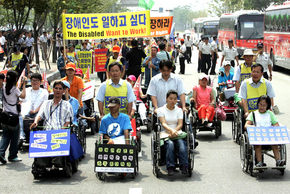 |
Case handed to Int’l labor body amid continued disagreement
The International Labor Organization (ILO) wrapped up its 14th Asia-Pacific conference in Busan yesterday, where the group agreed on the necessity of establishing an intra-national action plan to generate high-quality jobs in Asia. However, within the South Korean delegation, labor, management, and the government continued to fail to see eye-to-eye over labor standards. Korean Confederation of Trade Unions (KCTU), one of the nation’s two largest umbrella labor groups, in particular pressured the government to observe international labor standards, culminating in its filing a suit against the government to the ILO. Prior to suing the Korean government, the KCTU held a press conference and said, "The government doesn’t keep international standards at all, all the while stressing globalization." South Korea signed only 20 out of 100 treaties provided by the ILO for its member countries in 1991, compared to an average of 41 treaties signed by ILO members and an average of 72 for those member countries that are a part of the Organization of Economic Cooperative Development (OECD). In addition, Korea accepted just four out of ILO’s eight key agreements.Those accepted include stipulations against children labor and job discrimination. One of the treaties left unratified allows for freedom of association. To improve this right, the ILO urged the Korean government to guarantee civil servants’ ability to organize and to allow workers to form multiple unions, among others. In the process of negotiation over advancement of labor-management relations, too, Seoul has maintained a position that it would allow workers to form multiple unions. Regarding labor’s demand, the Ministry of Labor said that it would ratify about 30 of the ILO’s treaties by 2008. At the closing ceremony, the Asia-Pacific conference adopted a report urging the nation to promote regional cooperation and to establish in each nation an action plan to create better jobs. The report said, "The agenda of high-quality jobs enables nations to advance into fair globalization, under which countries can maintain a balance between their goals of economic development and social equality." "Starting from this conference and for the next 10 years, nations will try to create high-quality jobs. During the period, governments will place priority on 15 items, such as increasing productivity and improving immigrant labor management," according to the report. The next ILO conference will be held in Bangkok, Thailand in 2010.





